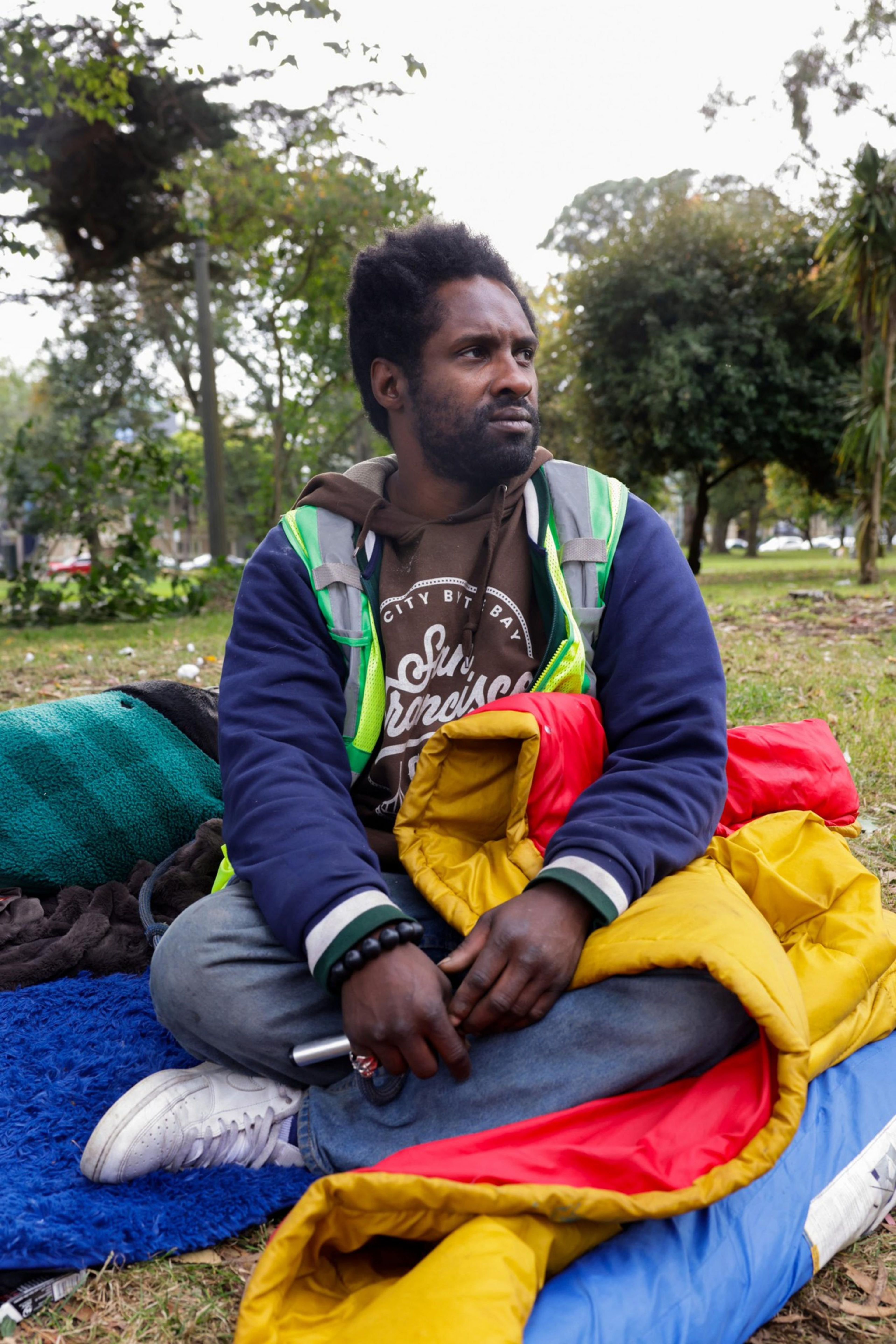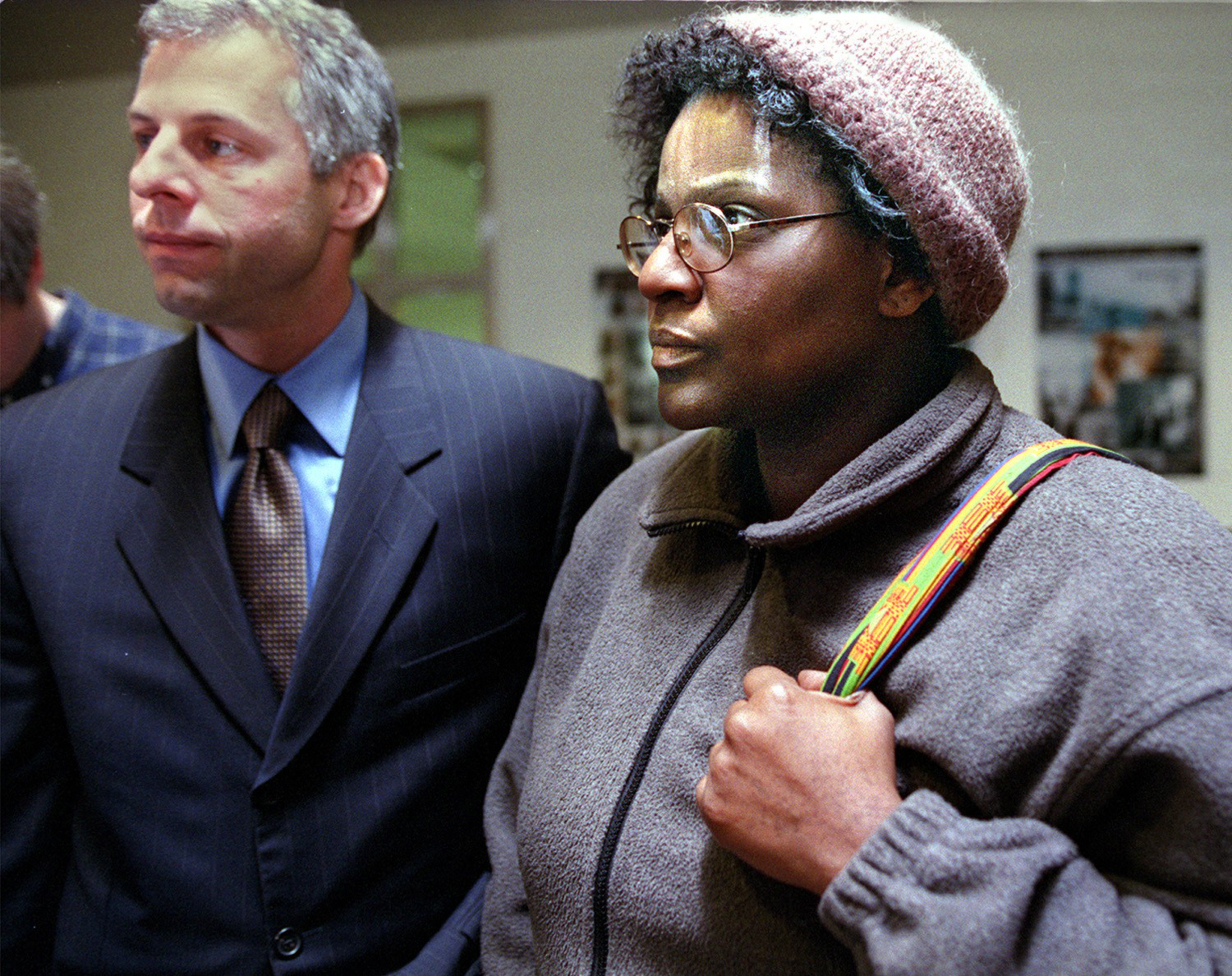San Francisco police have arrested one homeless person more than any other during their months-long crackdown on tent encampments.
Geoffrey Frye, 35, has faced five arrests for illegal lodging since July 30. But he continues to camp around the scene of his arrests — near the corner of Fell and Lyon streets — because it’s outside his mother’s home.
At least once a day, Frye says, police move him from one side of the street to the other. Sometimes he loses his tent and other belongings during encampment clearings. Other times he is arrested. But he never moves far from the housing complex he grew up in.
“I’m not sure if they’re trying to make it hard on me now because they think I haven’t had it hard already,” Frye said. “It just seems like they’re wasting their time.”

Frye’s first arrest under the crackdown took place Aug. 2 near the corner of Grove and Masonic streets. The subsequent three — Aug. 6, Aug. 19, and Sept. 10 — were at Fell and Lyon streets, roughly four blocks away. The most recent arrest occurred Nov. 14, another two blocks away, at the corner of Baker and Page. After each arrest, all for illegal lodging, Frye was cited and released at the scene.
When The Standard visited him Friday, Frye had returned to the corner of Fell and Lyon, with the few belongings he had left.
“I’m disappointed in myself,” he said. “How’d I get caught that many times?”
Officials say they have few options but to arrest people who refuse shelter. In a statement, Mayor London Breed’s office said, “Doing nothing is not an option.”
“We will always lead with compassion; offer shelter, services, and other ways for unhoused people to connect with their support networks,” her statement said. “But we cannot, and will not, let people remain on the streets, in tents, encampments, or vehicles if they refuse our offers; it is not safe or healthy for them or for the surrounding community.”
But Frye and others say they don’t want to live in shelters, where they may have to share a room, relocate across town, and abide by a curfew and other rules. Advocates for homeless people contend that the city’s approach is inhumane and a waste of resources.
Frye’s mother, Deborah Dodson, who lives in a senior and family housing complex next to the encampment, says her son needs time to recover from trauma he faced early in life.
“I just hate the way they’re treating him,” Dodson said. “They just continue to run him from one side of the street to the other.”

Frye tops a list of 33 people who have been arrested for illegal lodging more than once since July 30, according to a data analysis by The Standard. Of the 33, 81% were rearrested within a five-block radius of their first citation.
Frye said the enforcement has done little to coax him indoors. His sister Theresa Frye said police should focus on more serious issues.
“If y’all know he’s from the neighborhood, why do y’all keep bothering him? He’s not your target,” she said. “There’s other things they could do in the city than mess with the homeless.”
‘This is all he knows’
Frye has lived in the Panhandle since he was a year old, Dodson said. He grew up playing rugby and skateboarding. But at 10 years old, tragedy struck.
His father died, and just months later, Dodson shot and killed her abusive ex-husband Floyd Hollis outside their home.
Hollis, Frye’s stepfather, was a convicted child abuser who stalked the family and assaulted Dodson before she killed him in self-defense, according to news reports (opens in new tab). Dodson worked full-time as a Muni bus driver, meaning Hollis was often the only person looking after the children early in their relationship. She doesn’t know if he abused her son.
“I’ve asked my kids, ‘Did he do anything to you?'” she said. “I never got any straight answers.”

The district attorney never brought charges against Dodson due to Hollis’ history of stalking the family, freeing her from jail the following day. But it’s unclear whether Frye ever recovered.
“He did get a little therapy through a school program,” Dodson said. “But not nearly enough, I guess.”
Frye leaned on drugs and alcohol to cope, Dodson said. Around 2015, he lost his job, and his mental health deteriorated.
In 2022, disturbed by his meth use, Dodson gave Frye an ultimatum: Start contributing to household expenses or move out.
“I said, ‘Even something small. If you just get enough to cover your food allowances,’” Dodson said. “But he didn’t want to comply.”

Instead, Frye set up a tent outside Dodson’s apartment, often hanging out with a crew of troubled characters within view of his former home. He looks out for people on the street and wants to stay close to the neighborhood he grew up in, his mother said.
“This is all he knows. He loves it here,” Dodson said. “He’s a very nice person at heart. He’s a protector for some of the females who are out there. But I wish he would be more concerned about his own welfare.”
Dodson said it’s convenient that she can step outside to check on her homeless son, at times providing him with food, tents, and other gear. But neighbors have repeatedly complained about his encampment. When The Standard visited Tuesday, a woman in a puffy coat sneered at the group as she rode by on her bicycle.
“How much do you pay in rent?” the woman asked Frye sarcastically before riding off.
Dodson said she worries about her son’s mental health, recalling how he spent a month last year dressed in a “Winnie-the-Pooh” Tigger onesie — even showing up to court in it.
“I said, ‘Geoffrey, take that off, you have to be respectful in court,’” she said. “But it’s like talking to a brick wall.”

Dodson said she eventually invited her son back home, under the condition that he couldn’t use drugs inside. But he was uninterested.
Marnie Regen, a director at Larkin Youth Services, said drug use and homelessness are common among people affected by domestic violence at a young age.
“All of that just completely disrupts normal development,” Regen said. “You’re protecting yourself constantly; it’s a PTSD and trauma response, and they self-medicate with drugs.”
Dodson said she works with her pastor to seek answers and believes Frye needs therapy and time to live outdoors while he recovers. She said his condition has improved in recent months, thanks to a new medication.
“I always let him know he’s welcome to come back in, but he seems to have this fixation on being outside,” Dodson said. “I can only do what I can do. I ask God to give me strength and grace to keep going and not get all emotional about it, just to realize that every human being has a choice … even if it’s not the best choice.”
